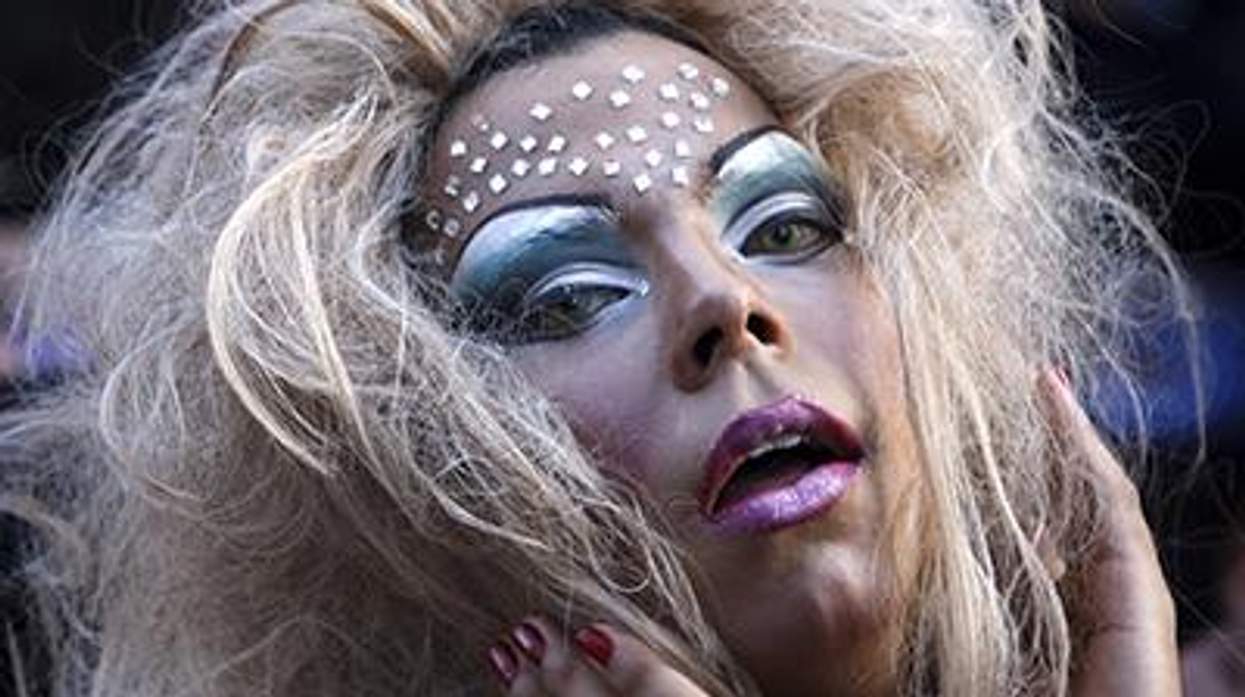"Now, the kilt was only for day-to-day wear. In battle, we donned a full-length ball gown covered in sequins. The idea was to blind your opponent with luxury."
-- Groundskeeper Willie, The Simpsons, 1994.
It challenges me to take seriously controversy around drag from the nation that invented the kilt and features it pridefully in masculine fashion. Glasgow Free Pride made headlines for declining to book drag acts, concerned about offending trans or questioning participants. Public response, which prompted organizers to change their stance, cited drag's role in queer culture and reminded us that drag queens and trans women stood together on the front lines of the Stonewall riots. There is no single transgender response to drag, so I will write about Aubrey, Jessika, and Avant, three women who by being sometimes helped me become always. Building dialogue and understanding sometimes starts with an overdue thank-you.
Aubrey Frost was the cross-dressing goddess of the Internet Explorer age, the late '90s, my formative years. She posted endless galleries of scanned film photographs -- digital did not exist yet -- snapped methodically with tripod and timer. Fiercely femme, donning dark tights, skirts, and dresses, she made one wonder how she could safely procure such a vast wardrobe. Her style, I later discovered, was "fish drag," named to depict blending within the school, as any young auburn-haired lady one might encounter. I thought I knew what a drag queen was, but she strayed from stereotypical gaudiness, defining herself a hobbyist cross-dresser and happily married straight male -- later, even a father.
Aubrey was everything I wanted to be, and countless others must have felt that way too. My mirror reflection was limited to whatever I could steal from my sisters. I owned a camera but categorically never took pictures. Someone would have to develop them, I worried, revealing my horrible secret. Aubrey, I imagined, had a part-time job as a photo tech to circumvent exposure, or she was fearless -- either way earning my distinction of goddess. Besides her sense of style, I aspired to her contentment to cross-dress. I could cope until I outgrew being trans, or so I thought. I have never actually met Ms. Frost nor tried to contact her; I was too scared. Her website is gone, but pictures are easily searchable -- a perpetual memory, or perhaps embarrassment. If transgender people could ever find drag offensive, it is only because someone was unabashed when we were not yet. I reject that and instead say "Thank you."
Jessika and I -- actually, her daylight alter ego and I -- were laboratory coworkers at my first job after college. She was a budding physicist by day and diva by night, hosting queer and drag events and volunteering for a sexuality resource center. Jessika was out, visible in the community as both a gay male and a drag queen, including at our workplace. She was intelligent and hardworking above all. Cross-dressing seemed more testament to her character and diversity of talent than something beckoning taunts or castigation. Jessika was a barometer for how I might fare once news broke that I too had a queer streak.
I asked Jessika to walk with me around our campus after work one day. I asked timidly about makeup and philosophical costumes, but the small talk is all blurred now. At some point, I said that I saw myself wearing a mask and slowly explained the path I was on. She stopped, turned, and gave me a surprisingly huge lanky-armed hug.
Becoming a woman, permanently or temporarily, is no easy task. She was uniquely equipped to empathize, but that was just the beginning. Jessika suggested I purchase my first pair of silicone breast forms when I lamented over tribulations with water-filled condoms. I was terrified to have such contraband delivered to my apartment; she took care of everything. Expressing femininity, whether sometimes or always, requires similar skill sets that both transfolk and drag performers missed out on in our childhood years, when we were culturally conditioned to express only one gender. If transgender people could ever find drag offensive, it is only perhaps in envy of drag queens' natural talent or grace. I reject that and instead say "Thank you."
Avant Garbage is the first reigning Miss Nerd New York. She describes herself by saying, "A discarded doll floats through radioactive waste before transforming into a beautiful woman!" Geek and fandom culture around sci-fi, comics, anime, and videogames is usually tremendously inclusive, as we were all socially marginalized. Once a presence within the mainstream, queer fandom is now creating its own spaces, such as geeky pageants and a convention ("con" for short), FlameCon, that attracted over 2,000 attendees. Like Jessika, Ms. Garbage self-identifies as a gay male for whom drag is just one ipseity. Being Garbage, however, permits her avenues to express further facets of herself as a designer and performer. She creates her own acts and even intricate outfits, from her signature refuse gown of loose ends to her eclectic cosplay bridging snake-charming Britney to alien-blasting Ripley. Being a female allows me to show more of myself too.
I met Ms. Garbage and her slightly cleaner counterpart, having already embarked upon my own life as a woman, though there were many subsequent steps to my journey the queer geek community saw me through. What humbles me about Avant Garbage and the broader circles that surround us both is that they are as fervent a fan base of me and my successes as I am of them of theirs.
When you need a bosom to lean on, as I sure as hell did, what difference does it make if it's built-in or birdseed? Those most blind to the mutual respect between drag and trans realms persecute us both equally as disturbed and deviant, without regard to the nuances setting us apart. If transgender people could ever find drag offensive, it is only perhaps because they believe drag mocks our realities first. I reject that wholeheartedly and instead say "Thank you."
I return to Ms. Aubrey Frost for one last reflection. The most recent update I could find on her, from 2012, said she was going by "Jo" and was in fact transitioning privately. An older, wiser, me might have suspected her pain and trajectory from the start. Her early bravery helped me become the friend to others now, drag performers and young trans folk alike, that she may have needed back then. If transgender people could ever find drag offensive, it is only perhaps by seeing within it reflections of our own imperfect selves. I reject that and instead wish I could meet her just once to simply say "Thank you."
 HANNAH ELYSE SIMPSON is a medical student, engineer, and marathoner. Her writing has appeared on Refinery29 as well as the Jewish Times of Baltimore. She is a volunteer coordinator for Trans Lifeline, and has appeared as a television guest commentator on trans issues with Melissa Harris-Perry on MSNBC, and elsewhere. Follow her on Twitter at @hannsimp.
HANNAH ELYSE SIMPSON is a medical student, engineer, and marathoner. Her writing has appeared on Refinery29 as well as the Jewish Times of Baltimore. She is a volunteer coordinator for Trans Lifeline, and has appeared as a television guest commentator on trans issues with Melissa Harris-Perry on MSNBC, and elsewhere. Follow her on Twitter at @hannsimp.


 HANNAH ELYSE SIMPSON is a medical student, engineer, and marathoner. Her writing has appeared on Refinery29 as well as the Jewish Times of Baltimore. She is a volunteer coordinator for Trans Lifeline, and has appeared as a television guest commentator on trans issues with Melissa Harris-Perry on MSNBC, and elsewhere. Follow her on Twitter at
HANNAH ELYSE SIMPSON is a medical student, engineer, and marathoner. Her writing has appeared on Refinery29 as well as the Jewish Times of Baltimore. She is a volunteer coordinator for Trans Lifeline, and has appeared as a television guest commentator on trans issues with Melissa Harris-Perry on MSNBC, and elsewhere. Follow her on Twitter at 

































































Charlie Kirk DID say stoning gay people was the 'perfect law' — and these other heinous quotes